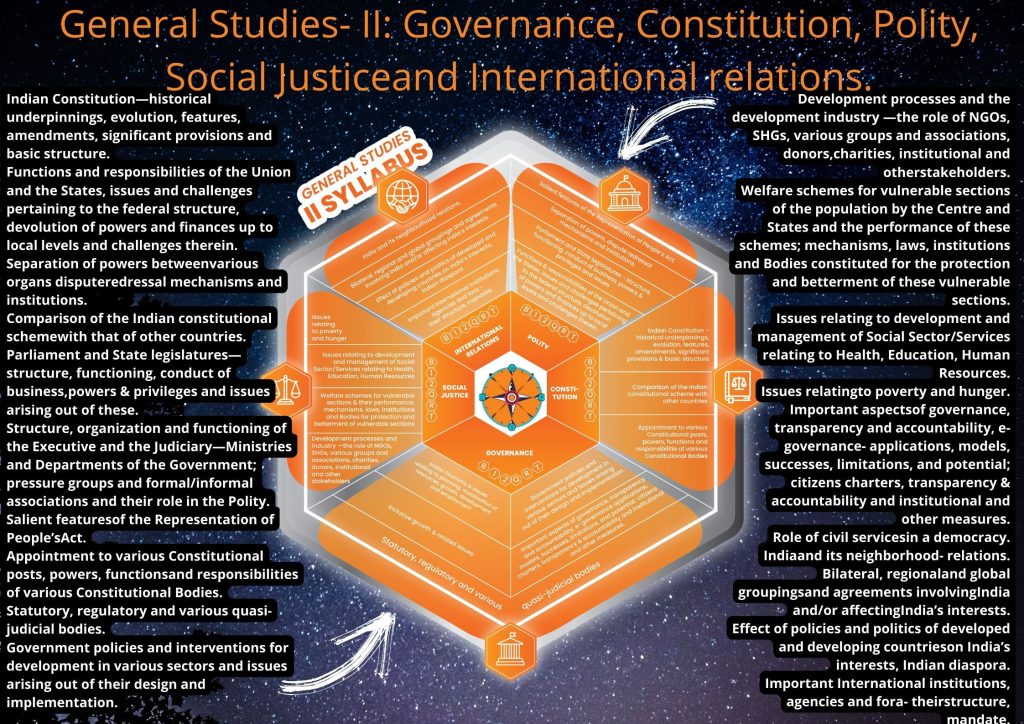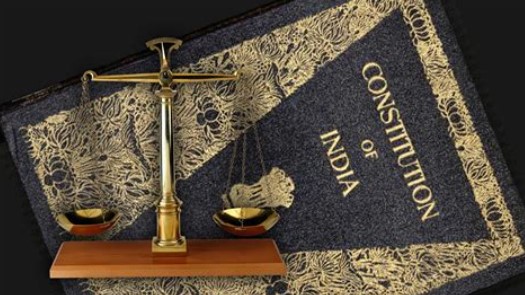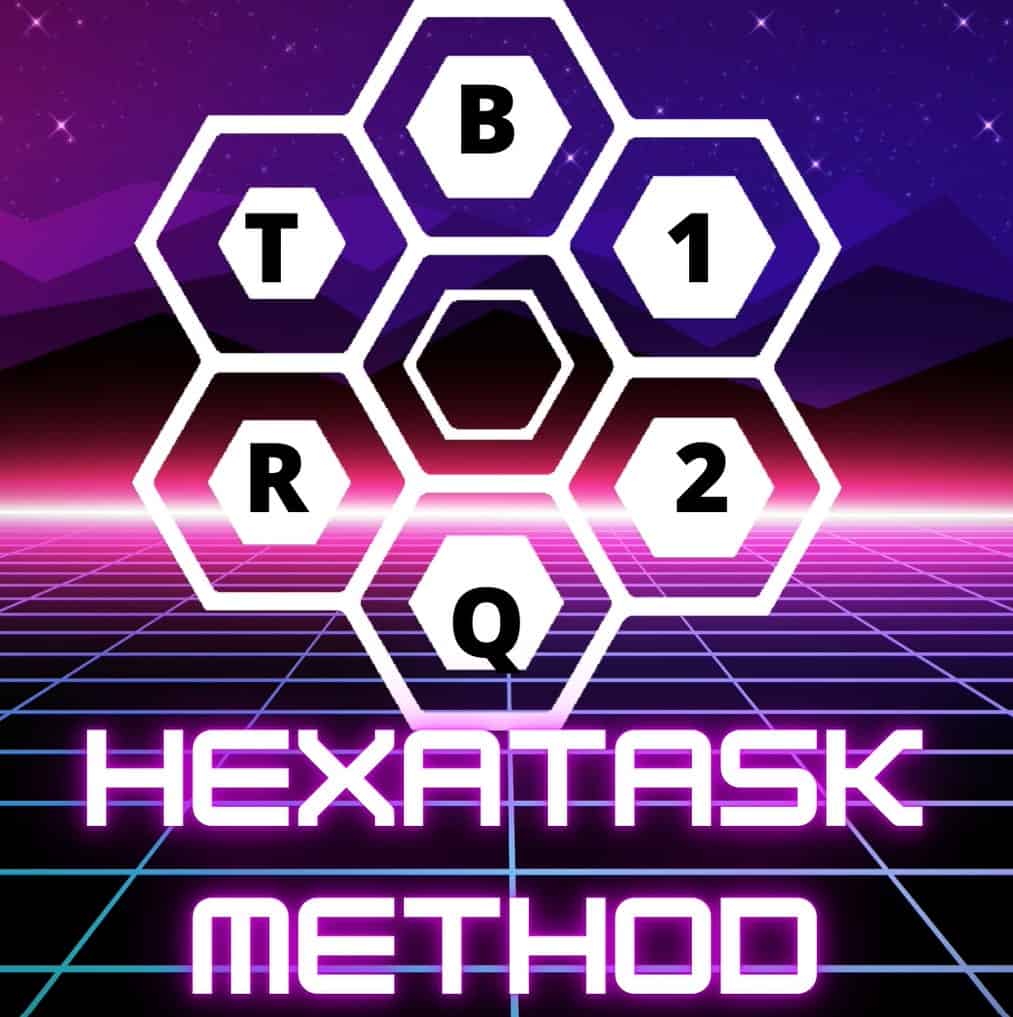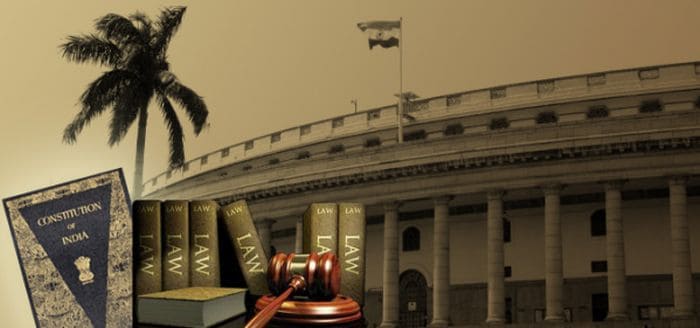UPSC Mains GS Paper 2 is titled “Governance, Constitution, Polity, Social Justice, and International Relations”. It is a 250-marks subjective paper that is considered for merit. This means that the score obtained in the UPSC Mains GS Paper 2 is considered for determining the final rank of the candidate.
POLITY HEXAGEM TESTIn simple words, GS Paper 2 in UPSC Mains is just Polity- in more analysis and detail than Prelims.

Syllabus for UPSC Mains General Studies Paper 1

How to understand the core of GS Paper 2
As a serious UPSC aspirant ought to know about Indian Polity as if it were the brochure about your future employer. Polity is interesting as well as important because it will teach you about how your future organization functions and the legal background which you will be embedded in, as a civil servant.

Polity includes all the rules of your own employment but also rules about everything else in the country- how the President of India is elected, how local governments function-basically, a blueprint for how to make the entire government structure a country. This includes mechanisms of how power should be distributed and the bodies which will wield it.
Don’t you want to know how the country you wish to serve is run and where you fit into the scheme of things? How can you change the system unless you know what the system is? Polity in GS Paper 2 and in Prelims is all about that system.
It is in this system in which you will function as one cog in a very large machine. No surprise that as a civil servant your primary responsibility is the efficient implementations of policies- how these policies, rules and laws are made is mentioned in detail in Legislative organ of the system.
The Constitution of India is the rulebook which contains details of how the system functions. The constitution is a strange type of rule book-one which contains within it mechanisms for its own modifications (constitutional amendments).
Polity is also highly correlated with current affairs, and you should be updates about recent laws, changes and policies.

The recent farm laws issue is a case in point where some policies of the government came in direct conflict with a section of the stakeholders. The fact that sections of people with common interest can congregate and protest is in fact, a fundamental right included in the constitution.
This right is one of many- some like the right to life Art.21 has undergone many revisions and updates as ‘life’ itself has evolved in our times.
Governance in GS paper 2 is about Challenges, Efforts and Potential solutions for the GOI
This is the largest and most overlooked aspect in the syllabus of upsc for increasing your GS Score. Understand that as a developing country, India has a lot of challenges to overcome. You are being recruited based on your fitness to handle those challenges.
Again, the UPSC is explicit about this-

The clues are all over the UPSC syllabus – More than 50% of the syllabus talks about different challenges. In fact most questions in the Mains and Interview ask you to directly address one challenge or the other.

The overarching goal for India is Inclusive and sustainable Growth, which contains many sub-goals such as –
- Challenges of Education: How to educate a traditionally agricultural country of billions, with dozens of different languages in use and a historically under-educated populace?
- Health care : How to provide quality health care to billions of people while most cannot afford to pay for private healthcare?
- Security: How to maintain internal security in a country as diverse as India where separatist sentiments are perpetually brewing in one part or another. How to maintain external security as a nation in a volatile subcontinent?
- Environmental preservation : With economic and industrial growth comes resource depletion and environmental degradation. How to balance both simultaneously?
- Changes due to Global warming and Climate change: As a tropical country with a large vulnerable population, how to prepare and safeguard against the effects of Climate change?
- Weaker section protection and empowerment: Large sections of Indian society were marginalized historically. How to push these sections up to par in terms of opportunity and prosperity, while remaining equitable and fair?
- Economic Growth and Employment: How to keep the economic engine churning jobs and high output while balancing Private Business interests with social causes?
This list is not exhaustive but if you notice carefully you will see that all of these are clearly mentioned in the UPSC syllabus.

These goals are, in a way, the syllabus FOR any Indian Government – your future employer which is why these goals are in the UPSC syllabus as well.
The broad goals of the Government of India (regardless of political party) are formally enshrined in the Constitution of India. They are most explicitly mentioned under the ‘Directive Principles of State Policy’.
How are these challenges to be met? Through the Executive Branch of the Government which is structured into separate ministries.
Notice how closely almost each one of these challenges or goals corresponds to a different ministry of the Government.
There is an uncanny overlap between the DPSP, list of ministries and the UPSC syllabus- it is almost as if the same list of challenges is written in different words in all three places.
Rules of Examination for UPSC Mains General Studies Paper 2
- Total Marks: 250 marks, Time duration: 3 hours.
- There are 20 questions printed both in ENGLISH and HINDI.
- All questions are compulsory.
- The number of marks carried by a question/part is printed against it.
- Answers must be written in the medium authorized in the admission certificate which must be stated clearly on the cover of this question-cum-answer (QCA) booklet in the space provided.
- No marks will be given for answers written in the medium other than the authorized one.
- Answers to questions no. 1 to 10 should be in 150 words, whereas answers to questions no. 11 to 20 should be in 250 words.
- Keep the word limit indicated in the questions in mind.
- Any page or portion of the page left blank, must be struck off clearly.
PYQ for UPSC Mains General Studies Paper 2
How to prepare Indian Polity for UPSC
Know that you can not capture all the details of GS paper 2 Indian Polity in one reading alone. The process takes long and should be done in a scientific manner- this is what the HEXATASK METHOD comes to the rescue.
The 6 tasks of the Hexa-task method are Big Picture Formation, 1st Reading, 2nd Reading, Analyze PYQs, Revision, and Testing. Completing these tasks while learning a subject will ensure optimal preparation for the UPSC exam for Polity.

Here’s how to do Big Picture Formation for GS paper 2-
Booklist for GS Paper 2 Polity
- Indian Polity’ by Laxmikanth (Do read this book at least three times)
- Class 11 NCERT – ‘Indian Constitution at Work’
- PRSINDIA website and Policy reports
**No other books are recommended because no more books are needed for Polity. The above books must be studied repeatedly and supplemented with Current affairs and ongoing debates wrt India Polity for GS paper 2.
Critical Insights for preparing Polity
- Polity requires a fair amount of memorization as well as analysis. You will require more than a few readings to download all the important factual information in your brain, but it gets easier with every repetition.
- Google Polity jargon whenever and wherever you encounter it. While doing so, always check what Google News has to say about that topic. Ex- Google Article 21 and find why it was in the news recently-
- At the end of 2nd reading to judge if you are on the right track- you be able to understand and appreciate, more complex issues of governance and be aware of all major laws, government schemes and policies of the previous year.
- By this stage, you should know the details of the Articles of constitution by heart. And analyse the burning debates about laws, reforms, government policies in detail.
- Polity is highly inter-related with Current Affairs, and you will need to refer back to your textbook whenever you come across news laws, judiciary etc and see what the constitution has to say about it

You should be well-versed with all major themes and events in the governance sphere of the country and abroad including the Annual policy review document of PSR India.
CONCLUSION AND KEY-TAKE AWAYS
Polity in GS Paper 2 and Prelims includes the factual status of things as they stand in present times. Topics include demographics, Geographical features, flora, fauna, economic infrastructure – Ports, Railways, Post etc
Indian polity and governance is extremely important and carries a lot of weight-age in the exam. Think about Polity as getting to know your future employer.

If you wanted to work for a specific company, you would go to their website and understand the organisational setup and get to know the company a little bit.
Why not do the same with your future employer- the Government of India?
Technically speaking, as a civil servant, your boss is the President of India, but who elects or selects the President? Topics like these are covered in Indian Polity.
Your challenge will be what NOT to read rather than what to read because there virtually an unlimited amount of information out there about this section.
All the best!
Ravi Kapoor IRS